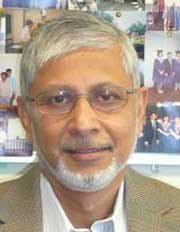The Demise of Democracy and Human Rights Violations in Bangladesh: International Financial Institutions’ Culpability
SYDNEY, NEW YORK, WASHINGTON DC, Aug 06 (IPS) - The International Monetary Fund (IMF), World Bank and Asian Development Bank (ADB) are complicit in the gross human rights violations and death of democracy in Bangladesh. They continued to supply financial blood line to the regime, well-documented for its corruptions, human rights violations – such as forced disappearances and tortures in custody – and riggings of votes, including politicization of state institutions in its slide into autocracy. This is despite their professed commitment to transparency, accountability and good governance (IMF, World Bank, ADB).

A democratically elected government must not bear responsibility for any loan agreements that these organizations had with a regime remaining in power through rigged elections. The financial support from these multilateral institutions have provided legitimacy to a regime which is regarded widely as illegal, thus enabled it to survive.
Continued life-line from the IMF, World Bank and ADB
The IMF approved Bangladesh's US$4.7 billion bailout in January 2023. The first review of the bailout plan was cleared in December and gave Bangladesh immediate access to about US$468.3 million for its economy and about US$221.5 million in support of its climate change agenda.
On 21 June, 2024 the World Bank's Board of Executive Directors approved two projects totalling US$900 million. The Bank's yearly commitment of loans increased from US$2 billion in 2015 to US$3 billion in 2018.
The (ADB) has been a major source of external financing in Bangladesh, providing an average of US$2 billion per year since 2016. As of 31 December 2023, ADB has committed 726 public sector loans, grants, and technical assistance totalling US$31.8 billion to Bangladesh. Cumulative sovereign and non-sovereign loan and grant disbursements to Bangladesh amount to US$23.52 billion.
Legitimizing an undemocratic regime
The government led by Sheikh Hasina retained power in successive terms since 2014 through rigged elections, unprecedented in the history of the country. She used her majority in parliament to change the constitution, especially the system of a neutral care-taker government to conduct elections, as well as to politicize state institutions with the sole aim of clinging to power.

The elections in 2014 were preceded by a severe government crackdown on the opposition, including widespread arrests, violence, attacks on religious minorities, and extrajudicial killings by the government, with around 21 people killed on the election day.
In 2018, the ballot boxes were filled the night before the election day. Following the rigged 2018 election, Deutsche Welle (DW) reported the findings of the Bertelsmann Foundation that Bangladesh has turned into an autocracy. Time Magazine in its cover story (30 Nov. 2023) expressed grave concerns about the fate of democracy in Bangladesh under the "Hard Power" of Sheikh Hasina. The New York Times (3 Sept. 2023) reported how "democracy in Bangladesh is quietly being crushed".
The recent election, held on 7 January 2024, was a sham, was characterized by bans of the opposition candidates and boycotts by the main opposition party, ‘dummy' candidates, coerced voting and a low voter turn-out.
Unfortunately, the IMF, the Bank and ADB turned a blind eye and continued to support the regime with a doubtful legitimacy. This has enabled the regime to become not only increasingly authoritarian, but also extremely corrupt.

Enabling corruption
Laudably in 2012, the Bank pulled out of a project to build Bangladesh's largest bridge, citing corruption concerns. However, it seems the Bank has been looking to absolve itself.
The Bank's recently approved loan of US$900 million to Bangladesh is apparently for strengthening fiscal and financial sector and ensuring sustainable and climate-resilient growth. This time, the Bank seems not to care that around 54.40% of funding for climate change mitigation projects was embezzled or wasted through various irregularities and corruptions, and the country's financial sector "has long been devilled by scandalous corruption".
Bangladesh is the 10th most corrupt country in the world. As Sheikh Hasina's regime turned into a kleptocracy after her winning power in 2008, nearly US$50 billion was siphoned off Bangladesh in six years (2009-2015). Money laundering by Bangladeshi elites is a "common knowledge". The names of 89 Bangladeshis have appeared in the Paradise Papers and 6 Bangladeshis have been named in Pandora Papers of the International Consortium of Investigative Journalists (ICIJ).
There is a clear link between autocracy and corruption. The US has imposed sanctions on a former Army Chief for his "significant involvement in corruption". A former Police Chief is also investigated for wide-scale corruption. Both played a significant role in undermining the democratic election process in Bangladesh and institutionalizing political repression.
A 2021 investigative documentary on Bangladesh, All the Prime Minister's Men by Al Jazeera, exposed wide-scale corruption by powerful political and military figures connected to Sheikh Hasina herself.
Odious loans not a democratically elected government's responsibility
Bangladesh is at a historic cross-road as it has just witnessed the demise of an autocratic and corrupt regime. In a re-born Bangladesh, the new democratically elected government should review all loan agreements of the corrupt and illegitimate regime, including those with China. If found dubious and the proportion lost in corruption, should be declared as "odious".
As United Nations Conference on Trade and Development (UNCTAD) emphasizes, the international law obligation to repay debt has never been accepted as absolute. The obligation to repay loans is limited only to the category or portion that are not deemed odious.
Anis Chowdhury, Emeritus Professor, Western Sydney University (Australia) & former Director of UN-ESCAP's Macroeconomic Policy & Development Division.
Khalilur Rahman, former Secretary of the UN Secretary-General's High-level Panel on Technology Bank for LDCs; former head of UN-OHRLLS's Policy Development, Coordination and Monitoring Service for LDCs'; former head of UNCTAD's Technology and Logistics Division, Management Division, Trade Analysis Branch and its New York Office.
Ziauddin Hyder, former Cluster Lead, World Bank
IPS UN Bureau
© Inter Press Service (2024) — All Rights ReservedOriginal source: Inter Press Service
 Global Issues
Global Issues